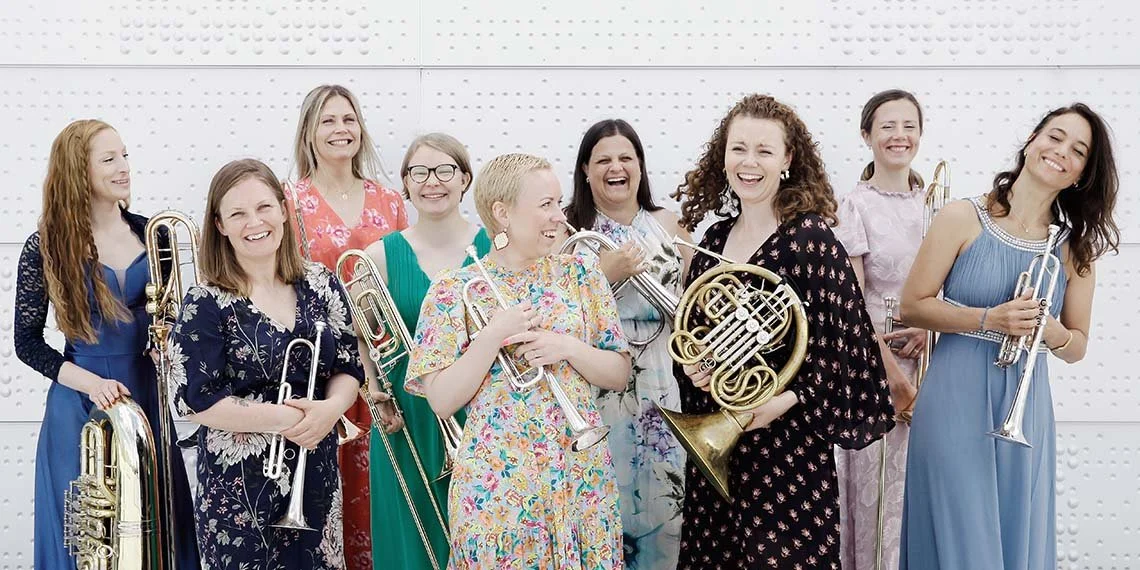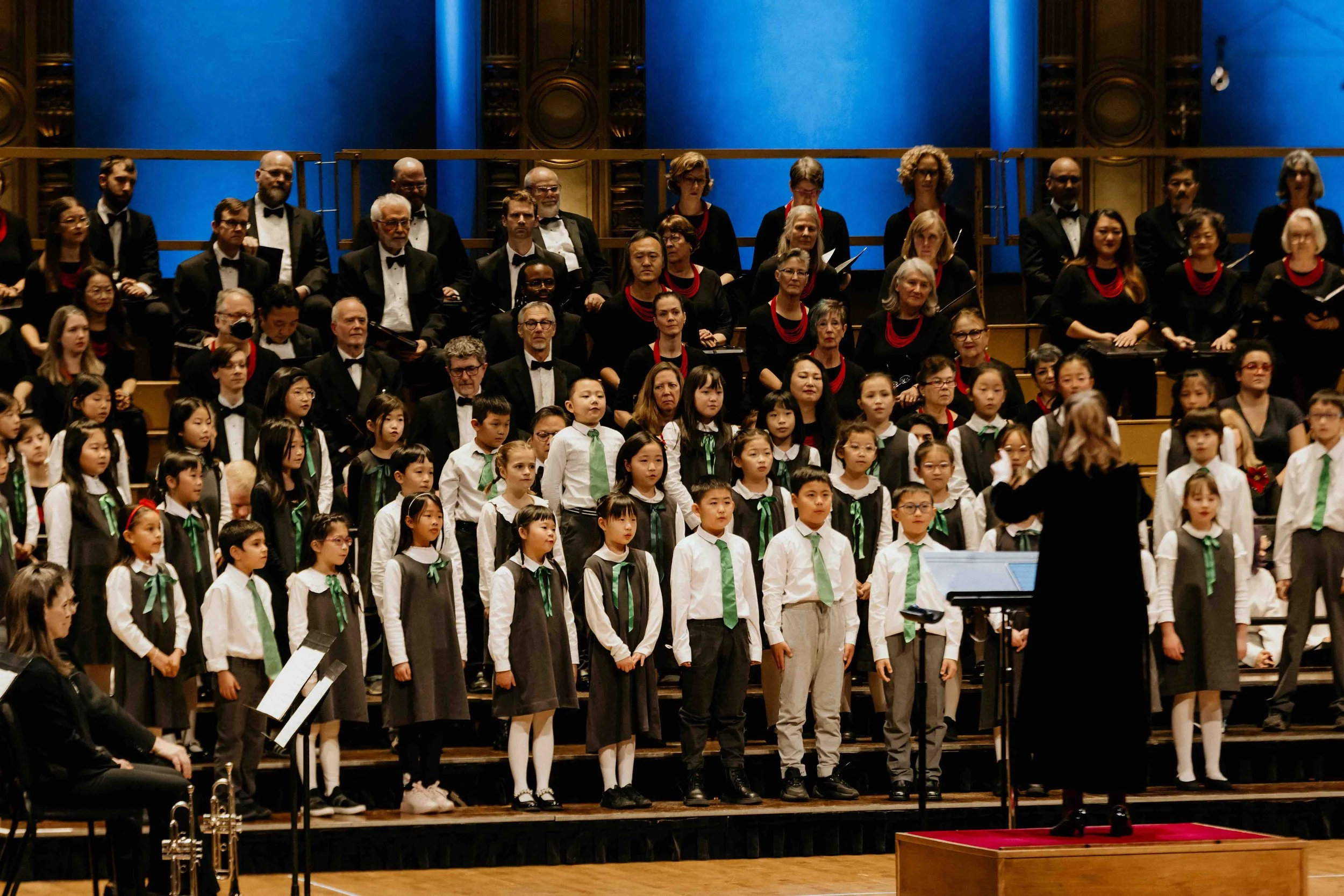Norway’s tenThing Brass Ensemble digs deeper than sunny pops tunes
Trumpet virtuoso Tine Thing Helseth leads the ebullient all-female group
tenThing Brass Ensemble.
Vancouver Recital Society presents tenThing Brass Ensemble on February 23 at 3 pm at the Vancouver Playhouse
IT’S PROBABLY FAIR to describe Norway’s tenThing Brass Ensemble as a “pops” project. After all, a casual trawl through YouTube finds the all-female tentet tackling such staples of the light-classical repertoire as “Les Toreadors” from Georges Bizet’s opera Carmen and Wolfgang Amadeus Mozart’s “Rondo Alla Turca”. The group’s mood is overwhelmingly ebullient, its outfits are cut from sunny pastel cloth, and its leader, trumpet virtuoso Tine Thing Helseth, is undeniably charismatic.
But dig a little deeper into the program that tenThing is about to present in its Vancouver debut, and a somewhat different picture emerges. Yes, those who turn up to their matinee concert at the Vancouver Playhouse on February 23 will be treated to a trio of Leonard Bernstein tunes from his West Side Story musical, a welcome if rather unseasonable rendition of George Gershwin’s “Summertime”, and the playfully rustic “Hoe-Down” from Aaron Copland’s ballet score Rodeo.
Crowd-pleasers all.
But what’s this thing called “Kjempeviseslåtten” in the middle of the program? And who is its composer, one Harald Sæverud?
Well, Helseth says, he’s one of Norway’s most beloved 20th-century composers, and “Kjempeviseslåtten” is a tune almost every Norwegian will know. It was written during the early 1940s, and was quickly adopted as the unofficial anthem of that country’s anti-fascist freedom fighters. (The title translates as “Ballad of Revolt”.) It may or not be coincidental that, to this listener at least, Sæverud’s original piano score bears at least a passing resemblance to the Catalan folk songs that provided strength and hope to the brave if ultimately doomed leftist partisans of the Spanish Civil War.
Hmmm. Playing a song of anti-fascist resistance in a Canadian concert at a time when our country is being threatened by a vile authoritarian from the south? There’s more going on here than a sweet, sunny pops show.
“There’s a lot of stuff going on at the moment, around the world,” Helseth says, with the kind of Scandinavian politeness that is not much different than our own. “In a way, I do think that our concert and our program and what we do is just ‘Come in to the concert hall and have a break. Have a good time.’ I think that’s nice. I mean, we need culture, we need music, especially in these times. We need to experience things together, and to have a sense of community, a sense of just being human beings together. We have this moment together, with the audience in the hall, that you can only experience live. For me, that’s something extra-special in turbulent times.”
As well, she continues, 2025 is a significant date, especially for those whose recent ancestors experienced the horrors of the Second World War. “‘Anniversary’ seems horrible to say, but it’s been 80 years since the war ended, and this piece by Sæverud is like a symbol of the whole resistance against the Nazis during the war times,” Helseth says. “People have a relationship, somehow, to this tune—and it’s also a lot of fun to play, because it’s loud and fast at the end, and that’s always very effective in the hall.”
And it’s also, Helseth admits, “more relevant than we would like”.
TenThing’s activism is also evident in its recently released recording She Composes Like a Man, which collects pieces from 13 female composers, and takes its title from a rather oblique compliment paid to one of them, the British piano virtuoso and suffragette Ethel Smyth, by one of her male contemporaries.
“I thought it was catchy and a bit provocative and everything in between, so I liked that,” Helseth says, laughing. Sunday’s program will include several pieces from the record, including works by the great pedagogue Nadia Boulanger’s sister Lili, whose early death robbed the world of a major compositional talent, and by the Polish composer Grażyna Bacewicz, who is as yet seriously underperformed in North America.
Naturally, these works are rhythmically vital, melodically strong, and full of distinctive character.
“I tend to gravitate towards composers that have a very special voice—a voice that is very present in the way that they compose,” the trumpeter explains. “And I love nice melodies. It’s my favourite thing in the whole world, and my approach to playing, personally, is very vocal, like the trumpet is my voice. That’s how I try to get my music across, and I just happen to play the trumpet. My approach is absolutely vocal.”
And if you have a voice, why not use it?
“It’s nice to do this real girl-power thing,” Helseth concludes, “and show people that no matter what gender you are, it’s possible to do what you want.”![]()

























